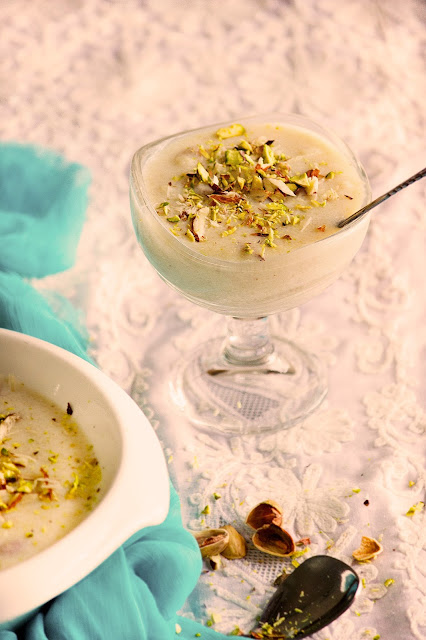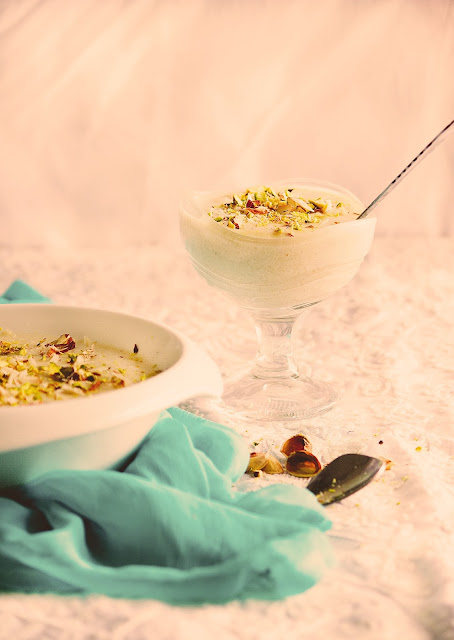Sujir Payesh / Rava Kheer / Mohonbhog
Okay...So, now I am officially fed-up!! First it rained
for a whole 1 and half month. Every time...morning, dawn, dusk, evening. I woke
up with rain. In the noon it rained and when I went to sleep, then also it
poured. Finally it stopped, we were relieved that finally monsoon took its time
off, but then came this blotchy and patchy weather. We haven’t seen Sun for
almost 2 months. It’s gloomy, cold, chilly, and foggy and I am all prepared to
call it stinky too.
All my dresses are stinking, shoes are stinking and the
beds....sadly they will stink soon too. What am I going to do then??
 |
| Roast the semolina with some ghee and green cardamoms |
 |
| Roast until the semolina becomes golden |
Hubby has bought a light sweater today to use in the
night!! Yes...you heard it right. This monsoon has become that much cold.
Nights are too chilled to sleep without a heavy cover.
 |
| Add milk, roasted cashews, raisins and sugar |
 |
| Add more milk to get that liquid consistency |
My cats have become cuddly too. They refuse to leave the
blanket even in the morning. One even crawls inside and tries to hold it back
when I pull it out of the bed.
Sujir Payesh / Rava Kheer / Mohonbhog is simply a semolina porridge.
The fine semolina is first roasted with ghee. Then simmered and thickened milk
is poured into it to create a smooth and creamy mixture.
Sujir Payesh is a very popular dessert come evening snack
among the Bengalis. Due to its light taste and simplicity it is more popular
among breakfast menus than the rice kheer / chaler payesh, which is prepared
for more grand and pious occasions. It is also a good option when we go for a not
so heavy lunch during a small gathering. Luchi / Bengali style puri and sujir
payesh is a match made in heaven. Chapatis with some spicy potato curry,
followed by a simple sujir payesh is the perfect Sunday breakfast I need.
Sujir Payesh / Rava Kheer / Semolina Porridge
Serves 4-6
Ingredients:
1/2 cup fine sooji / semolina
500ml whole milk – room temperature
Sugar – as per taste
½ cup broken cashew – raw (You can also use some almonds,
walnuts and pistachios)
¼ cup raisins (golden / brown)
4-5 green cardamoms
1 large bay leaf (optional)
1 tbsp ghee / clarified butter
Method:
Take a heavy bottomed saucepan and start simmering the
milk in it on low – medium flame.
Let it come to a boil and simmer on low for 10-12 minutes.
Once done put off the flame and keep the milk aside.
Heat and melt 1/4 cup of ghee in a kadai.
Put the cashew in them.
Sauté for 1 minute or until the cashews become lightly
brown. Immediately take them out off the kadai and transfer to a bowl.
In the same ghee put the raisins and sauté until they
puff up. It will take not much time. Once the puff up, take them out of the
kadai and keep them with the cashews.
In the same kadai add the green cardamoms, bay leaf and sauté for some seconds or
until the ghee becomes aromatic.
Now add the semolina or sooji and start stirring. Keep
stirring until the sooji / semolina becomes a little golden in colour.
Do not roast for too long or they will become brown. This will take some 5-6 minutes on low flame.
Once the sooji / semolina is nicely roasted and has
become golden, slowly pour the milk into the kadai while stirring the suji continuously to prevent them forming any lumps.
Add the already roasted and sautéed cashews and raisins.
Add the sugar. If you are not sure how much sugar you
will need, start by adding ¼ cup. This is the minimum, I always start with.
Then when all the sugar is dissolved, then taste and add accordingly.
Cover and cook the suji on low flame for about 10-12 minutes stirring occassionally depending on how thick you want your suji or mohonbhog.
Serve immediately.







Cake Delivery in Mohali
ReplyDelete